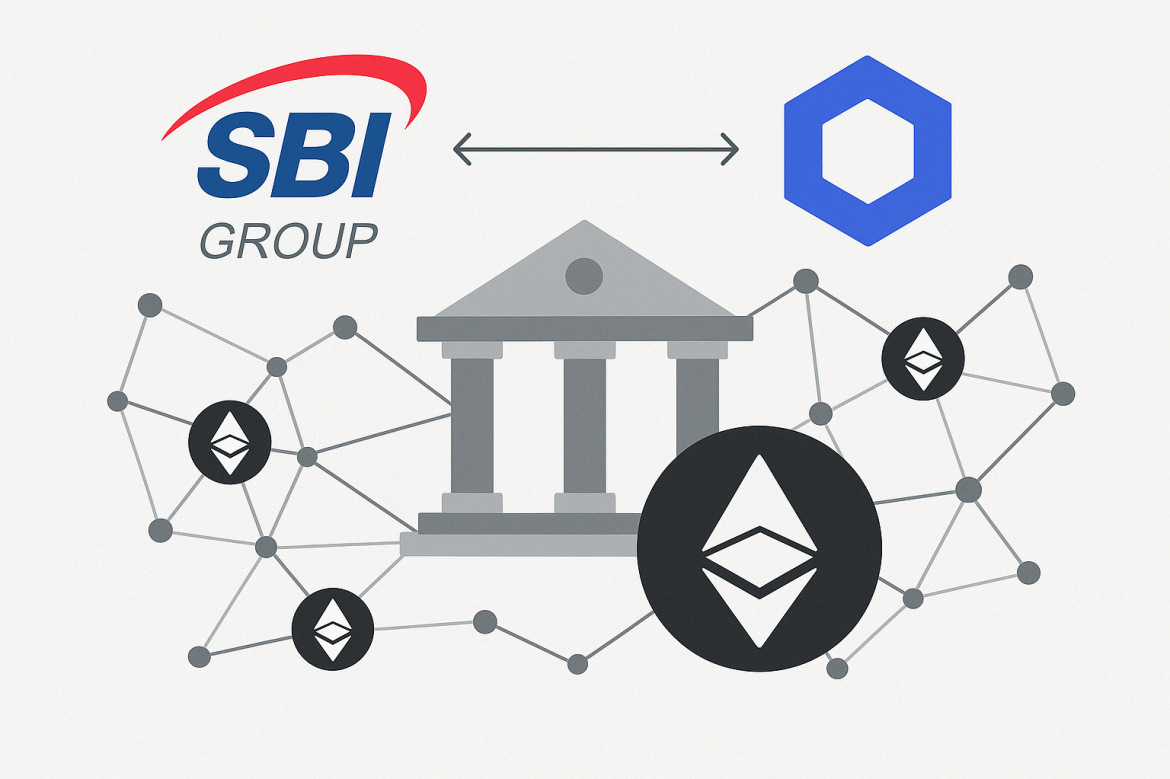
Japan’s SBI Group partners with Chainlink Labs to boost tokenization
Japan’s SBI Group, managing over $78.65 billion (¥12.1 trillion) in assets, has deepened its blockchain ambitions through a strategic alliance with Chainlink Labs.
The partnership aims to accelerate the adoption of tokenised real-world assets, cross-chain payments, and stablecoin verification across Asia.
It also signals how traditional financial institutions are preparing to integrate blockchain infrastructure into global markets, as Chainlink expands its institutional reach amid new technology rollouts and tightening liquidity in its native LINK token.
Chainlink to power SBI Digital Markets through CCIP
SBI Digital Markets (SBIDM), the digital-asset arm of the group, will integrate Chainlink’s Cross-Chain Interoperability Protocol (CCIP). The system enables secure movement of tokenised assets across both public and private blockchains.
We’re excited to announce that SBI Digital Markets (SBIDM)—the digital asset arm of Japan’s leading conglomerate SBI Group with ¥10+ trillion AUM—is adopting Chainlink as its exclusive infrastructure solution to power its digital assets platform.
sbidm.com/press-releases…
Through
796
Reply
Copy link
CCIP Private Transactions will allow SBIDM to execute compliant, privacy-preserving transactions without exposing confidential data such as transaction amounts or counterparty details.
SBIDM is also assessing Chainlink’s Automated Compliance Engine (ACE), a framework designed to enforce policy-based compliance across multiple jurisdictions.
Together, CCIP and ACE will underpin SBIDM’s plan to build a full-scale digital-asset ecosystem supporting issuance, settlement, and secondary trading of tokenised securities.
This collaboration expands upon prior work between SBI Group and Chainlink, including participation in the Monetary Authority of Singapore’s Project Guardian alongside UBS Asset Management.
The initiative successfully demonstrated how blockchain automation could simplify fund management processes and reduce administrative overheads.
Chainlink expands enterprise infrastructure
The partnership coincides with the launch of two major Chainlink technologies: Chainlink Runtime Environment (CRE) and Chainlink Confidential Compute (CC).
CRE serves as a unifying orchestration layer connecting Chainlink’s existing services, including Oracles, CCIP, Proof of Reserve, and ACE.
Meanwhile, Confidential Compute, expected to roll out in 2026, introduces privacy-centric smart contract execution for enterprise clients.
The technology will facilitate confidential transactions in sectors such as tokenised funds, private credit markets, and Delivery versus Payment (DvP) settlements, areas where institutional adoption is rapidly growing.
Chainlink’s growing client base already includes global financial names such as SWIFT, Mastercard, Euroclear, UBS, and ANZ. This reinforces its role as a bridge between blockchain and conventional finance.
SERGEY NAZAROV SMARTCON 2025 KEYNOTE
The infrastructure to unify global finance is now live.
Today, @SergeyNazarov announced that the Chainlink Runtime Environment (CRE) is live, marking the start of a new era in onchain development by enabling anyone to build
View replies
603
Reply
Copy link
Market sentiment and LINK supply shift
The announcement arrives at a volatile time for Chainlink’s native token, LINK. LINK has fallen 36.7% over the past month but recently showed signs of stabilisation, trading at $14.89 at press time, up 0.41% in 24 hours.
Source: CoinMarketCap
More than 80 million tokens, or about 11% of the circulating supply, were withdrawn this year, suggesting a growing preference for self-custody and long-term holding.
Whale accumulation has reached a multi-year high, indicating reduced selling pressure and renewed confidence in LINK’s long-term fundamentals.
Experts note that institutional partnerships and shrinking exchange supply could create favourable conditions for price recovery if market demand strengthens.
Broader implications for institutional blockchain adoption
For SBI Group, the partnership represents a strategic step toward building infrastructure capable of linking traditional markets with blockchain-based finance.
It also aligns with Japan’s growing regulatory openness to digital assets, including plans for yen-backed stablecoins and tokenised securities.
If executed at scale, SBI’s integration of Chainlink’s technology could mark a turning point for institutional blockchain use in Asia, paving the way for automated compliance, cross-border settlement, and tokenised capital markets.
The partnership’s success will depend on how effectively the two firms can turn prototypes into production-grade systems across regulated environments.
While market watchers remain cautious, Chainlink’s combination of institutional collaborations, expanding infrastructure, and declining token supply has created conditions for potential momentum.
Whether these developments can sustain a long-term rally remains to be seen.
The post Japan’s SBI Group partners with Chainlink Labs to boost tokenization appeared first on Invezz
